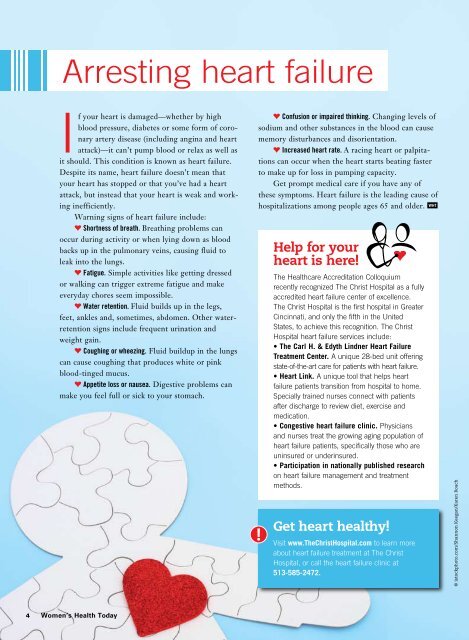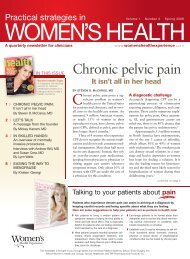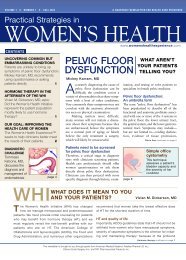Marg helgenberger's - The Christ Hospital
Marg helgenberger's - The Christ Hospital
Marg helgenberger's - The Christ Hospital
Create successful ePaper yourself
Turn your PDF publications into a flip-book with our unique Google optimized e-Paper software.
Arresting heart failure<br />
If your heart is damaged—whether by high<br />
blood pressure, diabetes or some form of coronary<br />
artery disease (including angina and heart<br />
attack)—it can’t pump blood or relax as well as<br />
it should. This condition is known as heart failure.<br />
Despite its name, heart failure doesn’t mean that<br />
your heart has stopped or that you’ve had a heart<br />
attack, but instead that your heart is weak and working<br />
inefficiently.<br />
Warning signs of heart failure include:<br />
§ Shortness of breath. Breathing problems can<br />
occur during activity or when lying down as blood<br />
backs up in the pulmonary veins, causing fluid to<br />
leak into the lungs.<br />
§ Fatigue. Simple activities like getting dressed<br />
or walking can trigger extreme fatigue and make<br />
everyday chores seem impossible.<br />
§ Water retention. Fluid builds up in the legs,<br />
feet, ankles and, sometimes, abdomen. Other waterretention<br />
signs include frequent urination and<br />
weight gain.<br />
§ Coughing or wheezing. Fluid buildup in the lungs<br />
can cause coughing that produces white or pink<br />
blood-tinged mucus.<br />
§ Appetite loss or nausea. Digestive problems can<br />
make you feel full or sick to your stomach.<br />
§ Confusion or impaired thinking. Changing levels of<br />
sodium and other substances in the blood can cause<br />
memory disturbances and disorientation.<br />
§ Increased heart rate. A racing heart or palpitations<br />
can occur when the heart starts beating faster<br />
to make up for loss in pumping capacity.<br />
Get prompt medical care if you have any of<br />
these symptoms. Heart failure is the leading cause of<br />
hospitalizations among people ages 65 and older. WHT<br />
Help for your<br />
heart is here!<br />
<strong>The</strong> Healthcare Accreditation Colloquium<br />
recently recognized <strong>The</strong> <strong>Christ</strong> <strong>Hospital</strong> as a fully<br />
accredited heart failure center of excellence.<br />
<strong>The</strong> <strong>Christ</strong> <strong>Hospital</strong> is the first hospital in Greater<br />
Cincinnati, and only the fifth in the United<br />
States, to achieve this recognition. <strong>The</strong> <strong>Christ</strong><br />
<strong>Hospital</strong> heart failure services include:<br />
• <strong>The</strong> Carl H. & Edyth Lindner Heart Failure<br />
Treatment Center. A unique 28-bed unit offering<br />
state-of-the-art care for patients with heart failure.<br />
• Heart Link. A unique tool that helps heart<br />
failure patients transition from hospital to home.<br />
Specially trained nurses connect with patients<br />
after discharge to review diet, exercise and<br />
medication.<br />
• Congestive heart failure clinic. Physicians<br />
and nurses treat the growing aging population of<br />
heart failure patients, specifically those who are<br />
uninsured or underinsured.<br />
• Participation in nationally published research<br />
on heart failure management and treatment<br />
methods.<br />
Get heart healthy!<br />
Visit www.<strong>The</strong><strong>Christ</strong><strong>Hospital</strong>.com to learn more<br />
about heart failure treatment at <strong>The</strong> <strong>Christ</strong><br />
<strong>Hospital</strong>, or call the heart failure clinic at<br />
513-585-2472.<br />
© istockphoto.com/Shannon Keegan/Karen Roach<br />
<br />
Women’s Health Today
















